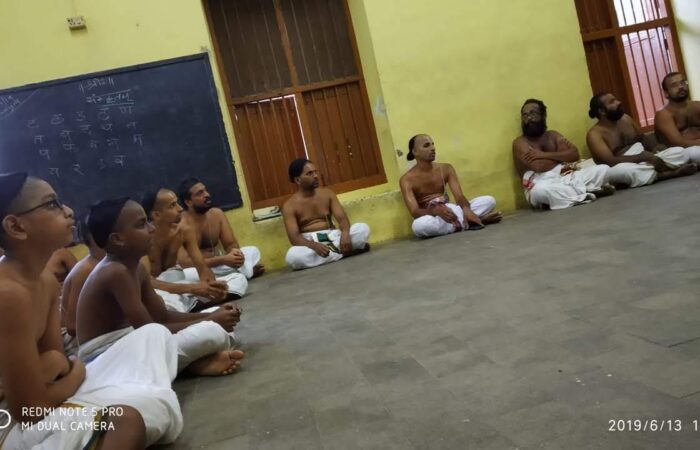Performing strictly their daily ablutions like Trikala Sandhyavandana as mandated in the Sastras and recitation of Stotras after their Sandhyavandana develop devotion and faith in the Sanatana Dharma.

In addition, the students are taught the essential portions of Yajur Veda, 4000 Divya Prabandham and Agama subjects. Emphasis is given more to the Students’ adherence to perform their nithya karmanushtana such as trikala sandhya vandana and reciting stotra pathas as per the sampradaya.
According to the University syllabus, Tamil, English languages, Computer Science are also taught in keeping with the requirements of modern times. This ensures and enhances the students’ employability after passing out.
This Mahavidyalaya was one of the oldest Institutions teaching Sanskrit in this country. It was established by the peerless preceptor, the 42nd Jeeyar of Sri Ahobila Math, Injimedu Srimad Azhagiyasingar in 1942 to teach Veda, Prabandha, Sastra and Sanskrit, all under one roof, in the traditional Gurukula style with a hostel attached.
The mission statement of the founder is maintained and nurtured by successive Jeeyars of the Math even to date. The Institution is well administered by Sri Malolan Educational Trust.
The Institution is recognised by Rashtria Sanskrit Sansthan, New Delhi(now Central Sanskrit University) as Adarsh Sanskrit Mahavidyalaya
The Mahavidyalaya is affiliated to the University of Madras in the faculty of Oriental Studies in the branches of Vyakarana, Nyaya and Visishtadvaita Vedanta and offer courses in Praksiromani I&II( 2years), Madhyamasiromani(B.A-3 years) and Siromani (M.A-2 years).
The students have access to a well-equipped Library that contains more than 10000 books, fully catalogued, under 18 categories and palm leaf Manuscripts. This will ensure to expand their knowledge base.
Participation in the debates organized by the Kalyana Abhivardhini Sabha, founded by the first Principal Goshtipuram Sri U.Ve. Sowmya Narayana charya Swami in 1942, improve their knowledge in the Sanskrit literature
Participating in National /level competitions and Seminars expose the students to increase their competitive spirit to perform better later in their lives
A full-fledged Computer Lab with peripherals are at the disposal of the Students to increase their Computer skill. Yoga practice and Sports activities stimulate the brain and physique
Performing strictly their daily ablutions like Trikala Sandhyavandana as mandated in the Sastras and recitation of Stotras after their Sandhyavandana develop devotion and faith in the Sanatana Dharma.
Learning the essential Veda and Prabandha ensure strong spiritual base for the student to face the problems squarely with equanimity in their lives.
The learning of essential portions of Scriptures such as Vedas, Agamas, Upanishads, Itihasa, Puranas, Srimad Bhagavad Gita, essential aspects of Dharma Sastras will have good grounding in their spiritual development.
Krishna Yajur Veda – Age 7 Completed(Duration – 7 Years)
4000 Divya Prabandha – Age 7 Completed(Duration – 4Years)
Praksiromani- 2 years:A pass in SSLC/OSLC/Samhitantam Veda adhyyanam/Agama
Madhyama Siromani (B.A.) 3 years:—-A pass in Praksiromani/Dip in Sanskrit. Even if there is no prior Sanskrit knowledge at the time of admission provided the same is acquired within 6 months of joining.
Siromani (M.A) 2 years: A pass in Madhyamasiromani/B.A(Sanskrit)